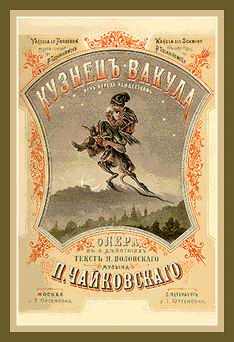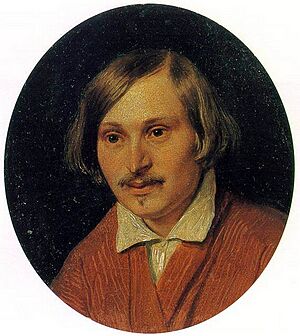Vakula the Smith facts for kids
Quick facts for kids Vakula the Smith |
|
|---|---|
| by Tchaikovsky | |

Cover of a piano reduction
|
|
| Native title | Russian: Кузнец Вакула |
| Librettist | Yakov Polonsky |
| Language | Russian |
| Premiere | 11 February 1869: Mariinsky Theatre, Saint Petersburg |
Vakula the Smith (Russian: Кузнец Вакула, romanized: Kuznéts Vakúla, lit. 'Smith Vakula' ), also known as Opus 14, is an opera by Pyotr Ilyich Tchaikovsky. An opera is a play where the story is told mostly through singing. This opera has a Ukrainian theme and is divided into 3 acts and 8 scenes.
The story for the opera, called the libretto, was written by Yakov Polonsky. It is based on a famous story by Nikolai Gogol from 1832, called "Christmas Eve" (Russian: Ночь перед Рождеством, Noch péred Rozhdestvóm). Tchaikovsky wrote this opera after another composer, Alexander Serov, started working on the same story but passed away.
Contents
Creating the Opera
Tchaikovsky wrote Vakula the Smith between June and August 1874. He started it while on holiday in Nizy and finished it in Usovo. He dedicated the opera to the memory of Grand Duchess Elena Pavlovna, who had died in 1873.
Tchaikovsky entered his opera into a competition without revealing his name. He used the motto "Ars longa vita brevis est," which means "Art is eternal, life is short." His opera won the competition, and he received 1500 rubles. Later, Tchaikovsky changed and improved the opera in 1885. He then renamed it Cherevichki, which means The Slippers.
First Performances
The very first performance of Vakula the Smith happened in Saint Petersburg on December 6, 1876. It was performed at the Mariinsky Theatre. Eduard Nápravník conducted the orchestra.
Main Characters
This opera features several interesting characters:
| Role | Voice type | First Performer |
|---|---|---|
| Vakula, a smith | tenor | Fyodor Komissarzhevsky |
| Solokha, Vakula's mother, a witch | mezzo-soprano | Anna Bichurina |
| A devil from Hell | bass | Ivan Melnikov |
| Chub, an elderly Cossack | bass | I. Matchinsky |
| Oksana, Chub's daughter | soprano | Wilhelmina Raab |
| Pan Golova | bass | Osip Petrov |
| Panas, Chub's friend | tenor | V. Vasiliev |
| Schoolmaster | tenor | N. von Derviz |
| His Highness | bass | Fyodor Stravinsky |
| Master of Ceremonies | bass | |
| Attendant | tenor | Pavel Dyuzhikov |
| Old Cossack | bass | |
| Wood Goblin | bass | |
| Chorus and other roles: Lads, lasses, elders, musicians, water spirits, wood-sprites, echo, spirits, court ladies and gentlemen, Zaporozhtsï | ||
Vakula the Smith was performed 18 times at the Mariinsky Theatre. However, Tchaikovsky was not completely happy with it. Because of this, he did not allow it to be performed in other theaters. This led him to revise it into Cherevichki in 1885.
Musical Instruments Used
The orchestra for Vakula the Smith includes many different instruments:
- Strings: Violins (first and second groups), Violas, Cellos, Double Basses
- Woodwinds: Piccolo, 2 Flutes, 2 Oboes, 2 Clarinets, 2 Bassoons
- Brass: 4 Horns, 2 Trumpets, 3 Trombones, Tuba
- Percussion: Timpani (kettledrums), Triangle, Tambourine, Cymbals, Bass Drum
- Other: Harp
- On/Offstage: A Wind Band (played from offstage)
Tchaikovsky's Thoughts
Tchaikovsky really loved working on Vakula the Smith. He wrote in a letter to his brother, Anatoly, on May 12, 1875: "All my thoughts are now intent upon my beloved child, darling Vakula the Smith. You would not imagine how I love him! It seems to me that I will positively go mad if I don't succeed with him."
A music critic named César Cui wrote about the opera in 1876. He said that while the music was "noble and beautiful," the style was more like a symphony (a piece for orchestra) than an opera. He also felt the music didn't always match what was happening on stage.
Other Works Based on the Story
The story of "Christmas Eve" by Nikolai Gogol was popular and inspired other composers too:
- Mykola Lysenko wrote an opera called Christmas Night (1872—1883).
- Tchaikovsky himself revised his opera into Cherevichki (1885).
- Nikolai Rimsky-Korsakov also wrote an opera called Christmas Eve (1895).
See also
 In Spanish: Vakula el herrero para niños
In Spanish: Vakula el herrero para niños
 | Precious Adams |
 | Lauren Anderson |
 | Janet Collins |


